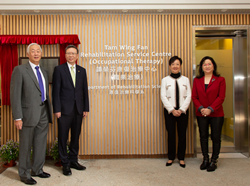
Officiating guests unveil a plaque to formally name the Centre.
With the continuous ageing trend in the population of Hong Kong and the Government’s advocacy in advancing primary healthcare services, we anticipate that the demand for rehabilitation services, which is an essential part of primary healthcare, will increase substantially in the future.
HONG KONG (PRWEB)
November 20, 2020
The Tam Wing Fan Rehabilitation Service Centre (Occupational Therapy), named after its donor Mr Tam Wing Fan, a distinguished Hong Kong architect and philanthropist who generously supported education, research and community service, is the second rehabilitation centre operating on the PolyU campus. With state-of-the-art equipment, veteran academic researchers and experienced occupational therapists, this new Centre provides comprehensive OT services for people of all age groups, including treatments for musculoskeletal, neurological and mental health dysfunctions. In view of the ageing population and the rising needs for primary healthcare services in the community, the Centre will become a service point for the public, with an emphasis on elderly care and offering treatments for common neurological diseases, elderly falls and fractures, and mental health conditions.
Mrs Tam said people’s well-being has always been in her and Mr Tam’s heart. They were very pleased to collaborate with PolyU, so that they could bring comfort and relief to all those who are suffering in pain. She looks forward to seeing the positive impact that can be brought about by this meaningful project. Mrs Tam added, “We are living in difficult times, but you can do your part to make this a kinder world.”
At the Appreciation Ceremony of the establishment of the Centre, Professor Jin-Guang Teng, President of PolyU, extended his heartfelt gratitude to Mr and Mrs Tam, “PolyU is deeply grateful to Mr and Mrs Tam for their generous donation to our University. My most sincere thanks also go to Dr Lawrence Li, our Deputy Council Chairman, and Dr Katherine Ngan, Chairman of the University Court and Chairman of the Foundation, PolyU for their staunch support all along.”
“Over the past 40 years, we have nurtured more than 6,000 occupational therapists and physiotherapists. Many of them are now working in the healthcare industry and contributing to the well-being of Hong Kong people. With the continuous ageing trend in the population of Hong Kong and the Government’s advocacy in advancing primary healthcare services, we anticipate that the demand for rehabilitation services, which is an essential part of primary healthcare, will increase substantially in the future. Through this Centre, we will serve our community with steadfast dedication, thereby upholding Mr Tam’s belief of compassionate love,” added President Teng.
Located in W210 and W211, Ho Iu Kwong Building at PolyU, the Centre boasts cutting-edge equipment including rehabilitation robots such as end-effectors and exoskeletons for upper-limb training of patients with hemiparesis after stroke and cerebral palsy, as well as social robots, immersive virtual reality equipment, a brain-computer interface (BCI) system, and neurofeedback and biofeedback devices. The Centre’s occupational therapists are experts in providing evidence-based practice for patients, such as constraint-induced movement therapy (CIMT) and neurodevelopmental treatment for improving arm motor ability resulting from neurological challenges, cognitive rehabilitation of stroke or brain injury victims, and stress management for people with emotional disorders.
The Department of Rehabilitation Sciences of PolyU, which manages the University’s two rehabilitation centres, is at the forefront of providing professional OT and physiotherapy (PT) education as well as expanding knowledge in the rehabilitation sciences, especially in the areas of neuroscience, musculoskeletal disorders, geriatric rehabilitation and an East meets West approach in rehabilitation. It also vigorously promotes translational research in order to bring discovery in basic sciences to clinical practice. The new Centre will be a platform for knowledge transfer, enabling PolyU experts to transform their cutting-edge research into clinical applications. In addition, it will serve as an important base for clinical education of PolyU OT students and inbound OT exchange students.
Share article on social media or email:

